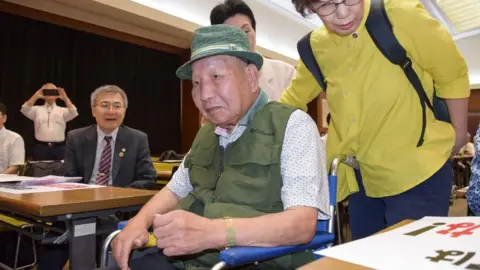 Getty Photographs
Getty PhotographsA Japanese man who spent almost 50 years on demise row earlier than he was acquitted of homicide shall be compensated 217 million yen ($1.45m), in what his attorneys say is the nation’s largest-ever payout in a felony case.
Iwao Hakamata, 89, was discovered responsible in 1968 of killing his boss, his boss’s spouse and their two youngsters, however was acquitted final 12 months after a retrial.
Mr Hakamata’s attorneys had sought the best compensation potential, arguing that the 47 years in detention – which made him the world’s longest-serving demise row inmate – took a toll on his psychological well being.
Decide Kunii Koshi, who granted the request on Monday, agreed that he had suffered “extraordinarily extreme” psychological and bodily ache.
The Japanese authorities can pay Mr Hakamata’s monetary compensation, in what native media is extensively reporting as the largest payout for a felony case within the nation’s historical past.
Mr Hakamata’s case is one in every of Japan’s longest and most well-known authorized sagas.
He was granted a uncommon retrial and launched from jail in 2014, amid suspicions that investigators could have planted proof that led to his conviction.
Final September, a whole bunch of individuals gathered at a courtroom in Shizuoka, a metropolis on Japan’s south coast, the place a choose handed down the acquittal – to loud cheers of “banzai”, or “hurray” in Japanese.
Mr Hakamata, nonetheless, was unfit to attend the listening to. He was exempted from all prior hearings due to his deteriorated psychological state.
He had lived below the care of his 91-year-old sister Hideko since being granted a retrial and launched from jail in 2014. Hideko had fought for many years to clear her brother’s identify.
Mr Hakamata was working at a miso processing plant in 1966 when the our bodies of his boss, his boss’ spouse and their two youngsters had been recovered from a hearth at their dwelling in Shizuoka, west of Tokyo. All 4 had been stabbed to demise.
Authorities accused Mr Hakamata of murdering the household, setting fireplace to their dwelling and stealing 200,000 yen in money.
Mr Hakamata initially denied doing so, however later gave what he got here to explain as a coerced confession, following beatings and interrogations that lasted as much as 12 hours a day.
In 1968 he was sentenced to demise.
For years, Mr Hakamata’s attorneys had argued that DNA recovered from the victims’ garments didn’t match his, and alleged that the proof was planted.
Though he was granted a retrial in 2014, extended authorized proceedings meant it took till final October for the retrial to start.
The case has raised questions on Japan’s justice system, together with the time taken for a retrial and the allegations of compelled confessions.
Extra reporting by Chika Nakayama, Gavin Butler and Shaimaa Khalil

